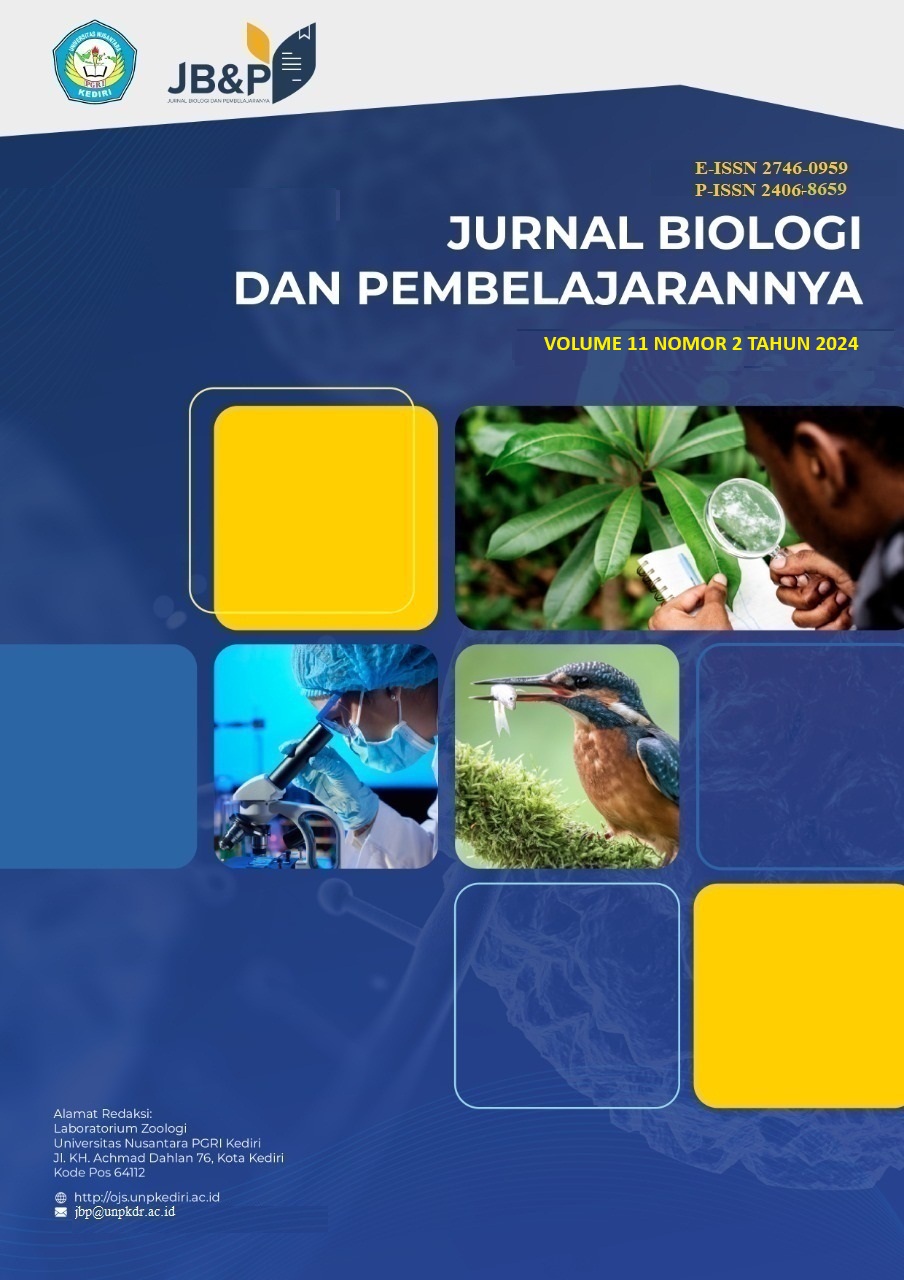Implementasi Discovery Learning untuk Mengetahui Hasil Belajar Kognitif Mata Pelajaran IPAS di SMKN Mojoagung
DOI:
https://doi.org/10.29407/jbp.v11i2.22271Keywords:
Cognitive, Discovery Learning, IPASAbstract
The discovery learning learning model is a learning model that can develop or improve student learning outcomes in the cognitive domain. This research aims to determine the influence of the implementation of the discovery learning learning model on cognitive learning outcomes in IPAS lessons at SMKN Mojoagung. This research is quantitative research using a quasi experimental design model. The research used a one group pretest-posttest design method, starting with a pre-test (initial test). After that, it was followed by a post-test (final test). The subjects of this research were class X RPL (Software Engineering) students, totaling 33 students. The data collection technique uses a question giving test (pretest dan postes). Quantitative descriptive analysis technique. The research results showed that students' cognitive learning outcomes increased from 69.46 to 88.72. Based on the results of the t test, sign <0.05 is obtained, namely 0.000. So it can be concluded that the discovery learning learning model influences cognitive learning outcomes in IPAS lessons at SMKN Mojoagung
References
Andreani, D., & Gunansyah, G. (2022). Persepsi Guru Sekolah Dasar Tentang Mata Pelajaran IPAS pada Kurikulum Merdeka. Jurnal Pendidikan Guru Sekolah Dasar, 11(9), 1841–1854.
Anggita, A. D., Subekti, E. E., Prayito, M., & Prasetiawati, C. (2023). Analisis Minat Belajar Peserta Didik Terhadap Pembelajaran IPAS di Kelas 4 SDN Panggung Lor. Jurnal Pendidikan Guru Sekolah Dasar, 7(1), 78–84.
Arliyanti, D., & Kresnadi, H. (2016). Deskripsi Penilaian Kognitif dalam Pembelajaran Tematik Siswa Kelas V SD Negeri Pontianak Utara. Jurnal Pendidikan Dan Pembelajaran, 10(11), 1–10.
Hutajulu, T. (2021). Model Pembelajaran Discovery Learning Meningkatkan Hasil Belajar Mata Pelajaran Sejarah Kelas X SMK. Journal of Education Action Research, 5(3), 340–346.
Iwantoro, Rahmat, S., & Haris, A. (2022). Discovery Learning sebagai Inovasi Model Pembelajaran Pendidikan Agama Islam Pasca Pandemi Covid-19. JIE (Journal of Islamic Education), 7(2), 155–167.
Khasinah, S. (2021). Discovery Learning: Definisi, Sintaksis, Keunggulan dan Kelemahan. Jurnal MUDARRISUNA: Media Kajian Pendidikan Agama Islam, 11(3), 402–413.
Nurrahmayani, & Yusni. (2024). Penerapan Model Pembelajaran Discovery Learning dalam Meningkatkan Hasil Belajar Siswa. Journal on Education, 06(02), 14180–14186.
Putra, A., & Juliati. (2020). PENGARUH METODE PEMBELAJARAN PROBLEM SOLVING TERHADAP HASIL BELAJAR KOGNITIF SISWA KELAS V SD. Jurnal Elementaria Edukasia, 3(2), 365–369.
Putri, H., Susiani, D., Wandani, N. S., & Putri, F. A. (2022). Instrumen Penilaian Hasil Pembelajaran Kognitif pada Tes Uraian dan Tes Objektif. Jurnal Papeda, 4(2), 139–148.
Ramadhani, A. H. (2021). Pengaruh Pendekatan Pembelajaran Discovery Learning pada Hasil Belajar Siswa. Jurnal Pendidikan Guru Sekolah Dasar, 2(1), 96–102.
Rosyidah, L. A., & Sholihah, F. N. (2021). Pengembangan Perangkat Pembelajaran Berbasis Discovery Learning Melalui E-Learning pada Materi Ekosistem. Eduscope, 07(01), 2502–3985. https://ejournal.unwaha.ac.id/index.php/eduscope/article/view/1879%0Ahttp://ejournal.unwaha.ac.id/index.php/eduscope/article/download/1879/730
Salmi. (2019). Penerapan Model Pembelajaran Discovery Learning dalam Meningkatkan Hasil Belajar Ekonomi Peserta Didik Kelas XII IPS 2 SMA Negeri 13 Palembang. Jurnal Profit, 6(1), 1–16.
Tamrin, & Munawwarah, F. (n.d.). Tekhnik dan Instrumen Assessment Ranah Kognitif Peserta Didik dalam Pembelajaran PAI. Jurnal Al-Liqo, 04(01), 121–139.
Yogaswara, M., Novendra, A. M., Almujab, S., & Ramafrizal S, Y. (2019). ANALISIS PERBANDINGAN METODE PROBLEM BASED LEARNING DAN PROBLEM SOLVING UNTUK MENINGKATKAN KEMAMPUAN BERFIKIR KREATIF. Jurnal Ilmiah PGSD STKIP Subang, 5(2), 224–240.
Yustia, D. M., Megasari, D. S., & Wilujeng, B. Y. (2023). Penerapan Model Pembelajaran Discovery Learning pada Kompetensi Penataan Sanggul Tradisional Ukel Tekuk untuk Meningkatkan Hasil Belajar Siswa di SMK Negeri 2 Jombang. Jurnal Tata Rias, 12(3), 271–278.
Downloads
Published
Issue
Section
License
Authors who publish with this journal agree to the following terms:
- Copyright on any article is retained by the author(s).
- The author grants the journal, right of first publication with the work simultaneously licensed under a Creative Commons Attribution License that allows others to share the work with an acknowledgment of the work’s authorship and initial publication in this journal.
- Authors are able to enter into separate, additional contractual arrangements for the non-exclusive distribution of the journal’s published version of the work (e.g., post it to an institutional repository or publish it in a book), with an acknowledgment of its initial publication in this journal.
- Authors are permitted and encouraged to post their work online (e.g., in institutional repositories or on their website) prior to and during the submission process, as it can lead to productive exchanges, as well as earlier and greater citation of published work.
- The article and any associated published material is distributed under the Creative Commons Attribution-ShareAlike 4.0 International License













